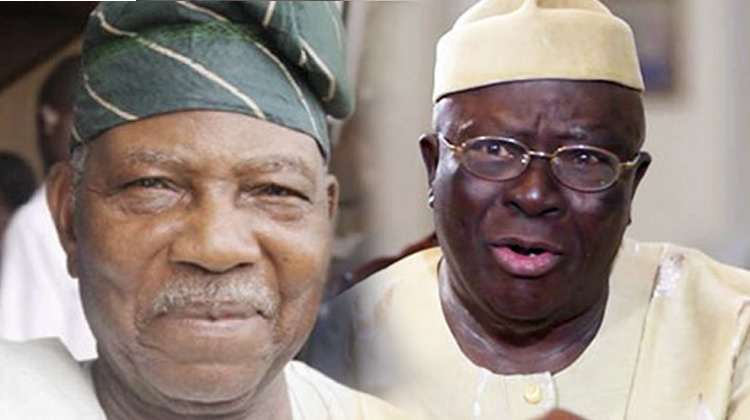The crisis rocking the Yoruba socio-political organisation, Afenifere, has deepened as its two leading figures, Pa Reuben Fasoranti and Pa Ayo Adebanjo, differed over support for presidential candidates and the group’s leadership position.
Although there was speculation that leaders of the group held divergent opinions about the way forward in the current political dispensation, their disagreement remained beneath the surface till the recent visit of the presidential candidate of the All Progressives Congress, Bola Tinubu, to the leaders of the group in Akure, Ondo State.
During the visit, which was turned into a mini political rally by Tinubu’s teeming entourage and the Afenifere chiefs who received him, the former governor of Lagos State, was endorsed by the group. Fasoranti and other leaders of the group also prayed for his success in the 2023 election.
Long before the visit, Adebanjo and a section of the group had endorsed the presidential candidate of the Labour Party, Peter Obi in September hinging their support on the need for the South-East geopolitical zone to produce its first president after other zones had had their turn.
At the Akure meeting, however, where Adebanjo was absent, the leaders endorsed and drummed up support for Tinubu.
The meeting was attended by Yoruba leaders from Oyo, Ogun, Ondo, Ekiti, Osun, Lagos, Kogi and Kwara States.
A statement issued, later, by the National Organising Secretary, Abagun Kole Omololu, described a Tinubu presidency as one that would “usher in a new era of hope, peace, security, harmony, gainful employment for the multitude, economic development, social and political stability.”
The organisation said Tinubu “shared with us his vision of a greater and more prosperous Nigeria where democratic rights, rule of law, justice and fairness will reign supreme. He also gave an assurance on steps to be taken to ensure the safety and security of Nigerians and their properties.”
The visit triggered a dispute within the group with some saying that Fasoranti, who stepped aside as leader and handed over to Adebanjo, as acting leader, should not have endorsed Tinubu on behalf of the group.
In an interview with Impact TV Africa, Fasoranti stated categorically that he neither resigned nor retired as the leader of Afenifere.
“I didn’t resign or retire from leadership. I was misunderstood. I think the best thing is to correct that,” he said, stressing that he was still the leader of Afenifere.
Speaking further in the interview, Fasoranti explained the group’s choice of Tinubu. He said, “As you can see, the trend, the approval and the acceptability. You could see what happened when Tinubu came to meet me in Akure. The media carried the whole thing.
“Adebanjo does not have the capacity to warn me not to welcome Tinubu. Can he do that successfully?
“What happened was that Adebanjo took a stand and I took a stand. I didn’t call him and he didn’t call me. We never spoke about the visit.
“As you saw yesterday, it goes without saying that Jagaban was accepted. Obi has no stand in our mind at all.”
Speaking to our correspondent, Adebanjo confirmed that he was not at the meeting in Akure, adding that he was not ready to enter into any controversy over the decision taken at the meeting.
He said, “In the first place, I was not supposed to be there. In the second place, we have made our position clear. Pa Fasoranti asked me if I was coming, I said if he asked me to come, but (I asked him to) tell him (Tinubu) what the position of Afenifere is. Once he has done that, I’m not going into any controversy about that.
“Afenifere has taken a stance to support Obi. Any other splinter or rebel group…I’m not going into any controversy about that. I regard that as a diversion. What we are going to do now is see that we succeed at the election.”
In the wake of the visit and Fasoranti’s interview, some have argued that Adebanjo’s position as acting leader is no longer tenable.
However, Adebanjo told our correspondent on Wednesday that Fasoranti lacked the power to remove him as he was just an ordinary member of the organisation.


